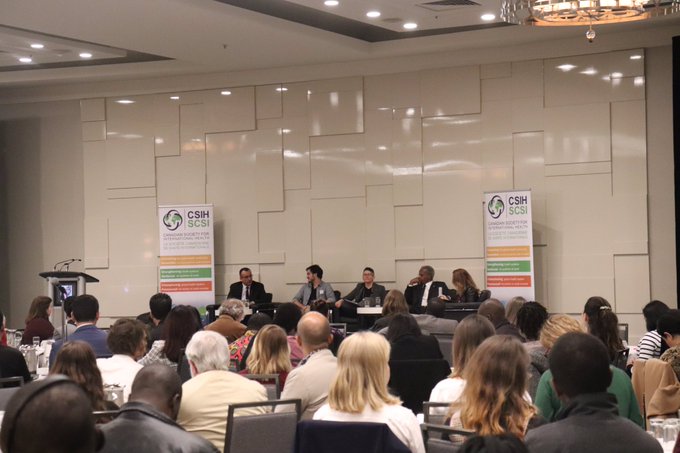The 2019 Canadian Conference on Global Health contributed to furthering the research agenda and debate on the global politics of health through the theme of “Governance for Global Health: Power, Politics, and Justice”. Having had the opportunity to participate thanks to the generous support for early career female participants from the Leacross Foundation, I offer below some reflections on key themes and insights that emerged for me from this year’s meeting.
The conference began with thought-provoking contributions during the opening plenary panel on ‘Globalization, governance, and diplomacy for health’. Sir George Alleyne highlighted challenges for the traditional citizen-state accountability relationship due to the complexity of the pluralist modern state, which involves the private sector and civil society in more significant roles within health governance. He advocated that governments should not be timid in their health diplomacy efforts, and that they should actively and transparently involve non-state actors.
Professor Lisa Forman reminded attendees of the need to ground our analyses in clear definitions of terms and in theory from the literature. In particular, she drew on Lukes' (2005) theory of power to highlight the invisibilisation of power structures within the social contexts in which we are immersed. This resonates significantly with my own approach to my research, providing a crucial framework for understanding the dynamics of governance and policymaking that shape health globally, and the need for caution regarding the engagement of certain types of non-state actors in health diplomacy and health governance processes.
Charles-Antoine Barbeau-Meunier contributed a useful broader contextual framing for discussion at the conference, highlighting contemporary shifts in the framing of economic systems and inter-generational equity brought about by youth advocacy.
Within the vast array of topics represented in the breakout panels, there were a number of very interesting sessions that highlighted key governance challenges, including the Global Governance panel series. The Global Governance 1 panel enabled insights into the role of power within health governance. The session opened with a presentation by myself on findings from a scoping review—led by Dr Jean-Benoit Falisse at the University of Edinburgh – of how community-based actors understand and use data within health service planning and management, highlighting imbalances of power between community-based and health system actors, which impact on data and information systems and community actors’ engagement with health service management.
Samuel Amon and Lauren Wallace provided in-depth analyses of health governance in Ghana grounded in political economy and ethnographic approaches, respectively. They illuminated challenges such as elite capture of government actors, financial and technical power among development partners, government capacity, and communication and coordination efforts.
From the Global Governance 2 panel, key takeaways from presentations by Maria Carolina Loureiro and Lesley Johnston included insights into the relationship between local governance and foreign policy, in terms of the impact of foreign policy goals in Brazil on promoting domestic progress on the right to health, and Canada’s role in shaping women’s health through development assistance and mining development, respectively.
The presentation by Katrina Plamondon and Julia Pemberton was particularly interesting, providing an action model for health inequity challenges based on the intersections between the disciplines of global health governance and integrated knowledge translation (IKT) (Plamondon and Pemberton, 2019). They argued that addressing health inequities is a knowledge-to-action problem, highlighting the need for policies that address the underlying structures that create an unfair distribution of power, wealth, and resources, which in turn impact on health outcomes. They articulated a way forward through an approach combining the relational, collaboration-based approach of knowledge generation and translation in IKT, with a focus on process, power, and systems-level analyses within global health governance.
Crucially, while advocating a pluralist and evidence-based approach to health governance for addressing wicked health inequity challenges, they also acknowledged issues of power in terms of representation within governance processes, framing and ideological approaches to health problems, and the development and selection of knowledge and evidence for decision-making. While setting forth a solution- and action-oriented approach, Plamondon and Pemberton nonetheless recognized the aspirational nature of the model and the true complexity of health governance dynamics, contributing a useful development of the global health politics literature.
The Q&A discussion at the Global Governance 2 panel session further highlighted many of the requirements for a productive research agenda on health governance, including the need for inter-disciplinary collaboration, questioning power dynamics, interrogating the moral licensing permitted by corporate social responsibility efforts, and building on the work of social movements such as the People’s Health Movement.
In providing a forum for discussions such as this to emerge, CSIH contributes to shaping contemporary and future debates and research in global health, promoting connections and collaborations for impactful research by global health researchers from Canada and around the world. I am grateful for the support of the Leacross Foundation in facilitating access to fora such as this for early career women such as myself to be able to learn and contribute to the development of this field.

